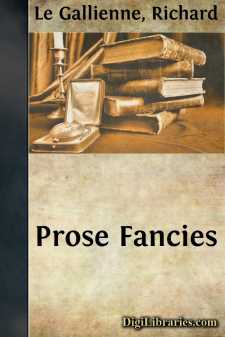Literary Collections
- American 84
- Ancient, Classical & Medieval 14
- Asian 1
- Australian & Oceanian 1
- Canadian 55
- Continental European 121
- English, Irish, Scottish, Welsh 179
- Essays
- General 24
- Letters 46
- Middle Eastern 1
Essays Books
Sort by:
This December evening, the imagination, by a law of contrast, recalls another December night two hundred and seventy years ago. The circle of darkness is drawn about a little group of Pilgrims who have come ashore on a sandy and inhospitable coast. On one side is a vexed and wintry sea, three thousand miles of tossing waves and tempest, beyond which lie the home, the hedgerows and cottages, the church...
more...
by:
John Galsworthy
THE INN OF TRANQUILLITY Under a burning blue sky, among the pine-trees and junipers, the cypresses and olives of that Odyssean coast, we came one afternoon on a pink house bearing the legend: "Osteria di Tranquillita,"; and, partly because of the name, and partly because we did not expect to find a house at all in those goat-haunted groves above the waves, we tarried for contemplation. To the...
more...
by:
Charles Cotton
Few things, in comparison of what commonly affect other men, move, or, to say better, possess me: for 'tis but reason they should concern a man, provided they do not possess him. I am very solicitous, both by study and argument, to enlarge this privilege of insensibility, which is in me naturally raised to a pretty degree, so that consequently I espouse and am very much moved with very few things....
more...
CLOCKS. There are two kinds of clocks. There is the clock that is always wrong, and that knows it is wrong, and glories in it; and there is the clock that is always right—except when you rely upon it, and then it is more wrong than you would think a clock could be in a civilized country. I remember a clock of this latter type, that we had in the house when I was a boy, routing us all up at three...
more...
ON THE ART OF MAKING UP ONE'S MIND "Now, which would you advise, dear? You see, with the red I shan't be able to wear my magenta hat." "Well then, why not have the grey?" "Yes—yes, I think the grey will be MORE useful." "It's a good material." "Yes, and it's a PRETTY grey. You know what I mean, dear; not a COMMON grey. Of course grey is always...
more...
MY DEAR COLVIN, - As I rode down last night about six, I saw a sight I must try to tell you of. In front of me, right over the top of the forest into which I was descending was a vast cloud. The front of it accurately represented the somewhat rugged, long-nosed, and beetle-browed profile of a man, crowned by a huge Kalmuck cap; the flesh part was of a heavenly pink, the cap, the moustache, the eyebrows...
more...
A SPRING MORNING I Spring puts the old pipe to his lips and blows a note or two. At the sound, little thrills pass across the wintry meadows. The bushes are dotted with innumerable tiny sparks of green, that will soon set fire to the whole hedgerow; here and there they have gone so far as those little tufts which the children call 'bread and cheese.' A gentle change is coming over the grim...
more...
by:
Joseph Addison
INTRODUCTION No character in our literature, not even Mr. Pickwick, has more endeared himself to successive generations of readers than Addison’s Sir Roger de Coverley: there are many figures in drama and fiction of whom we feel that they are in a way personal friends of our own, that once introduced to us they remain a permanent part of our little world. It is the abiding glory of Dickens, it is one...
more...
CHAPTER I. INTRODUCTORY. The ancient and famous metropolis of the North sits overlooking a windy estuary from the slope and summit of three hills. No situation could be more commanding for the head city of a kingdom; none better chosen for noble prospects. From her tall precipice and terraced gardens she looks far and wide on the sea and broad champaigns. To the east you may catch at sunset the...
more...
by:
Vernon Lee
MY DEAR MADAME BLANC, The first copy of this little book was, of course, to have been for Gabrielle Delzant. I am fulfilling her wish, I think, in giving it, instead, to you, who were her oldest friend; as I, alas! had time to be only her latest. She had read nearly all these essays; and, during those weeks of her illness which I spent last autumn in Gascony, she had made me rewrite several among them....
more...











